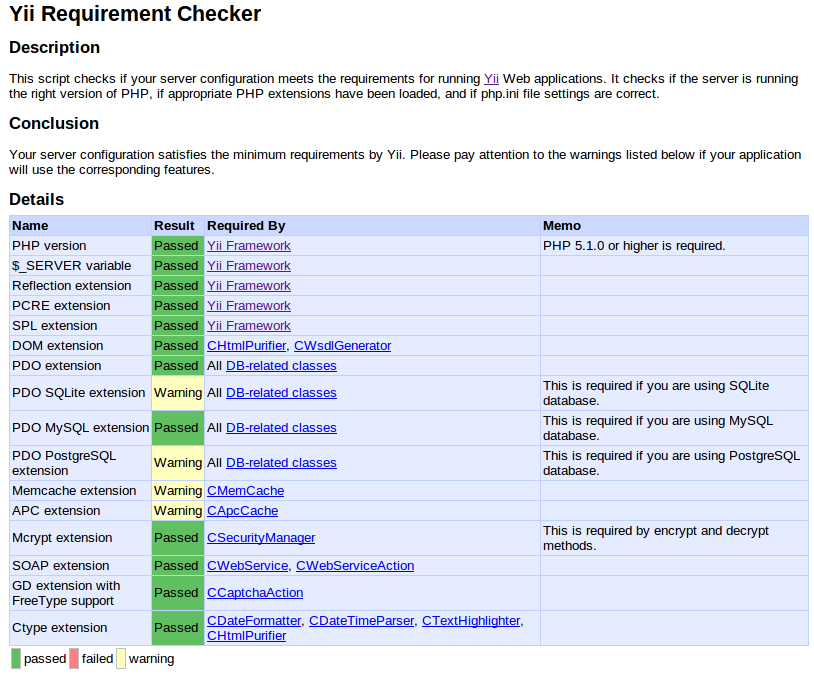© 2015 X2Engine Inc.
Difference between revisions of "Installation"
(→Recommended System) |
|||
| Line 58: | Line 58: | ||
== Recommended System == | == Recommended System == | ||
| + | The following attributes of the hosting environment are similar to the primary servers on which X2EngineCRM is most commonly developed and tested, and thus would be the most likely to never encounter problems: | ||
| + | * PHP 5.3.2 | ||
| + | * MySQL 5.5 | ||
| + | * Apache 2.2 | ||
| + | * Ubuntu 12.04 | ||
= Installation = | = Installation = | ||
Revision as of 23:38, 3 October 2012
Contents
System Requirements
Before installing X2EngineCRM, you should first ascertain whether your hosting environment is properly configured. The following features are required for X2EngineCRM to function properly:
- PHP version 5.3 or later
- PHP's cURL library
- A password-protected MySQL database server connection, and a database on which the user of the connection has all rights (i.e. select, drop, create and update).
- The Apache 2 web server, with mod_rewrite enabled.
Next, ensure that the requirements of Yii Framework, the application building framework on which X2Engine is designed, are met. To do this:
- Download Yii Framework and upload the "requirements" folder to your web server.
- Navigate to the requirements folder on your server using a web browser. You should see a page that looks similar to this:
Note that the following requirements are not necessary:
- The SQLite and PostgreSQL extensions; X2Engine depends on MySQL, so these other extensions will not be used.
- The DOM extension; it is not required.
- The caching extensions (Memcache, APC cache); caching is not currently required, although APC can increase performance
- The SOAP extension; the classes that depend on it are not used
Enabling PHP extensions
If your server does not meet the minimum system requirements for running X2Engine, and you are a system administrator of your server, you will be able to install the necessary modules. Note, however, that as of the most recent version, the MySQL PDO extension is the only extension used by X2Engine that isn't included by default and always enabled in PHP 5.3; the reflection class and extensions SPL, PCRE and Ctype should all be available if PHP is at version 5.3 or later.
In most distributions of Linux, PHP extensions can be easily installed by the distribution's default Package management system. That is the recommended method of installing them; typically, the package manager will automatically configure and reload the HTTP server to enable them.
Ubuntu & Debian
sudo apt-get install php5-mysql
The extension mbstring will typically be included in the Apache module package.
CentOS, RHEL & Oracle Linux
sudo yum install php-pdo php-mbstring
Without Requirements: What Won't Work
If your server environment does not meet the minimum system requirements, and it is not possible to add PHP extensions, you can still install X2Engine, though it is not recommended. Note the following issues that can occur:
Minor Issues
- cURL extension missing:
- Timezone widget will not work
- Cannot use local scripts that make API calls
Major Issues
- PHP version earlier than 5.3 (not recommended; has not been tested on versions earlier than 5.3)
- Chat widget will not work
- Installation form does not fully render (X2EngineCRM versions 1.6.5 - 1.6.6)
- Numerous controllers, models and components that use the function lcfirst
Critical Problems
- mbstring
- Application crashes
- pdo_mysql
- Application cannot run (required by Yii)
- All other PHP extensions:
- Application cannot run (required by Yii)
Recommended System
The following attributes of the hosting environment are similar to the primary servers on which X2EngineCRM is most commonly developed and tested, and thus would be the most likely to never encounter problems:
- PHP 5.3.2
- MySQL 5.5
- Apache 2.2
- Ubuntu 12.04
Installation
Installing X2EngineCRM requires you are able to perform the following taks (and have basic knowledge of how to perform them):
- Upload files to a server via FTP/SFTP or otherwise, using a server-based file manager
- Creating a MySQL database and a database user, if they aren't available already
Using The Installation Page
Installation generally proceeds as follows:
- Make sure a MySQL database and a database user with full permissions to that database are available from the web server.
- Upload the contents of the x2engine folder to the document root of the web server, or a subdirectory if desired.
- Navigate to the webroot (or subdirectory) where the contents of the folder were uploaded.
- Fill out the installation form.
System Requirements X2Contacts currently supports the following platforms and technologies. We are planning on adding support for many more databases, and will test and optimize the software for additional platforms based on demand. Databases: MySQL OS: Linux, Mac OS X, Windows (basically anything that will run an AMP stack) Web Servers: Apache Scripting Languages: PHP 5.1 and above Recommended System
We primarily developed X2Contacts on this setup, so it will probably offer the most reliable and compatibility:
PHP 5.3.2
MySQL
Apache 2.2
Ubuntu
If you have any questions, comments or complaints regarding installation, feel free to post them in this forum. We hope you enjoy your new software!
